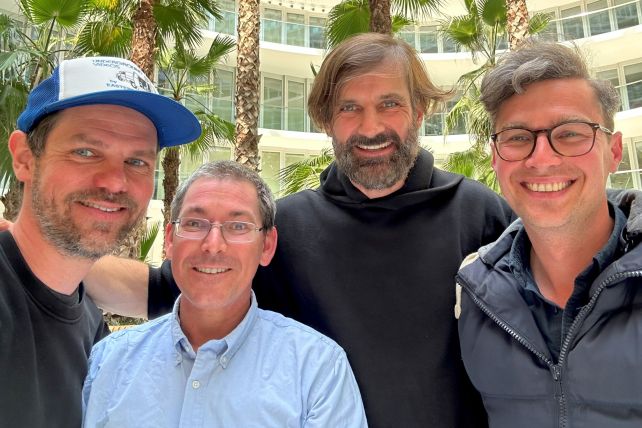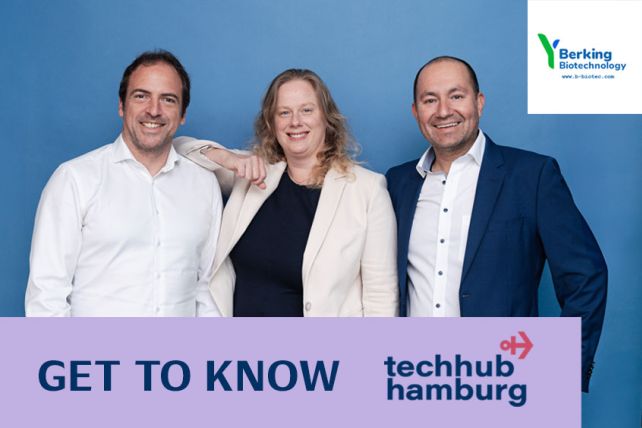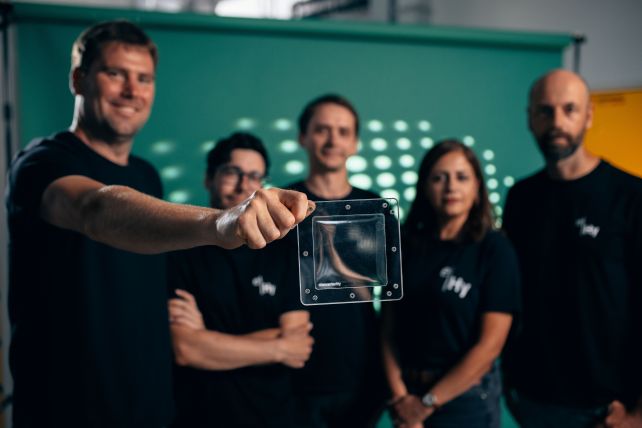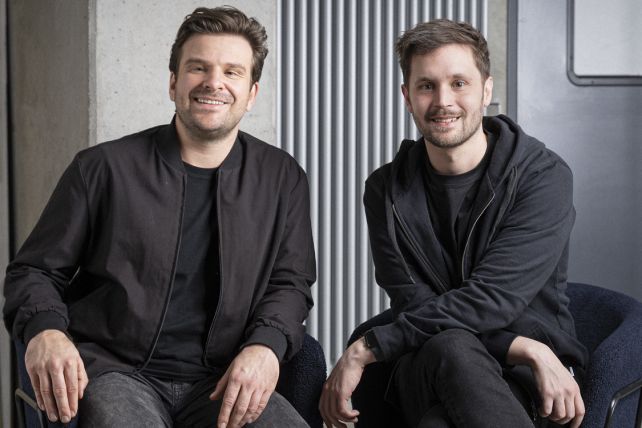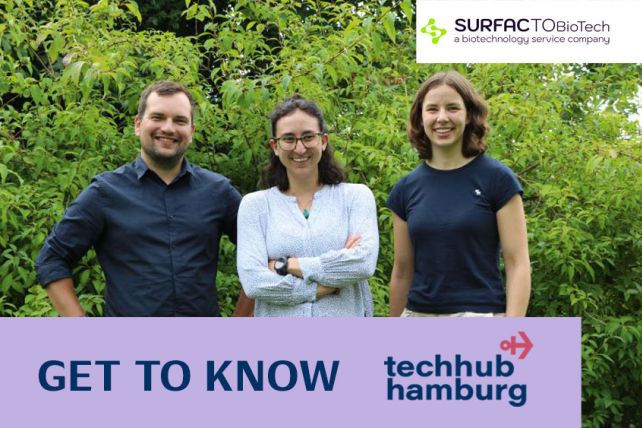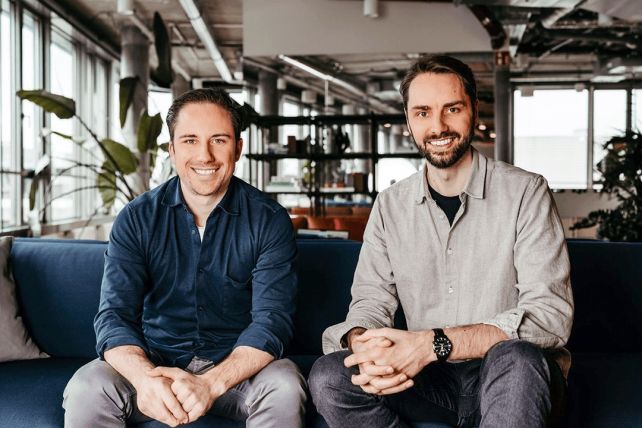shipzero makes freight transport more climate-friendly
Freight transport is one of the biggest sources of CO2 emissions. According to the European Environment Agency, road traffic accounts for almost 72 per cent, of which a good 38 per cent is caused by heavy and light trucks and also buses. In Germany, the proportion of freight transport by road is particularly high at around 72 per cent. The founders of shipzero, Mirko Schedlbauer and Tobias Bohnhoff, believe it is time for a change.

Decarbonisation is shipzero's mission
"Our mission is to decarbonise the global freight industry and shape a sustainable future," explains Schedlbauer. "The transport and logistics industry must reduce its CO2 emissions by 80 per cent between 2015 and 2050 in order to achieve the global climate targets. This will involve high levels of investment in new technology, new fleets and new fuels." Comprehensive data, precise analyses and efficient decisions are therefore essential, but these have been neglected for a long time. "Why are there no robust CO2 reporting standards in logistics, the only core industry with rising emissions since 1990? Although huge amounts of data are generated during the transport of goods, the potential for analyses and savings remains completely untapped. We have to change that," demands Bohnhoff.

Over 80 million transports already recorded in the emissions database
shipzero filled a gap in the market when it was founded in 2018 and has done pioneering work in this area. The startup, based on St. Annenufer in the Speicherstadt historical warehouse district, now enjoys a high reputation in the transport industry. Its customers include well-known companies such as Hellmann, BTG Internationale Spedition and Schneider Logistics. The emissions data platform is growing steadily and already records over 80 million transports in more than 100 countries. The team comprises over 40 employees. In May of this year, it successfully closed its Series A financing round with around eight million euros, after the seed financing in March 2023 had already generated an inflow of capital in the millions. Investors include the environmental technology fund ETF Partners as well as the VC investor Rethink Ventures, which specialises in mobility and logistics, the sustainability-focused investment company zu na mi and the London-based climate tech investor Raspberry Ventures.
shipzero accompanies its customers on their way to a decarbonised supply chain. The emissions data platform of the same name plays a central role in this. As registered users, shippers, logistics service providers and freight forwarders can use it to calculate and manage their transport emissions and generate reports. Co-founder Bohnhoff divides the functional process into three steps:
"Initially, all relevant data, such as actual consumption data from vehicle telematics, transport information and others, is collected and harmonised on shipzero to make the emissions calculation possible in the first place. Very few companies have bundled the necessary data for calculating emissions in one system. We take over this as the first step."

"The second step is to calculate emissions in accordance with international standards. This is where companies often lack expertise in calculation standards and regulatory requirements, which is where our expertise comes into play. We provide our customers with a status quo of their carbon footprint in transport logistics and can provide the data for external audits. Transport service providers also use this data to provide their clients with emissions reports for specific transport operations."
"The third step involves analysing the emissions data - only those who measure can also reduce effectively, as the data reveals the greatest levers for reducing emissions. Instead of relying on their own gut feeling, our customers can base their investment decisions on reliable data."
According to shipzero, this comprehensive analysis process enables its customers to make data-based and therefore efficient decisions regarding reduction measures. "We enable decision-makers to choose the greener alternative. And we also make it possible to measure the extent to which emissions are being saved," says Bohnhoff.

CO2 reduction as a cost factor speaks in favour of shipzero
shipzero's service has now become even more relevant with the introduction of a CO2 surcharge for the truck toll. This is because the increase in the charge by 200 euros per tonne of CO2 represents a relevant cost factor for many transport companies. This makes the need for data all the more urgent, so that transport can be handled in a more climate-friendly way in future and CO2 can be saved. "Large shippers and corporations are increasingly integrating sustainability criteria when selecting their partners and are even demanding more ambitious CO2 standards for trucks," states Caroline Nüsse, shipzero Business Development Manager, on the company's website. The pressure on the industry is likely to increase in the future. For shipzero, this could set the course for further expansion. And not just because the technology fits the current problem.

Trust is key when founding a company
The two founders were born in Hamburg and have known each other since their school days. Bohnhoff studied geography and worked as a strategy consultant and Head of Market Analytics at LSP Digital and Statista before founding the company. He is also involved as an EU Climate Pact ambassador. Schedlbauer has over ten years of expertise in data engineering and business intelligence and has gained experience in numerous logistics companies. He was already committed to climate protection during his studies in sustainability and innovation management. He is a co-founder of the non-profit initiative Global Shapers Hamburg, a sub-organisation of the World Economic Forum.
At shipzero, Bohnhoff is primarily responsible for commercial areas such as sales, marketing and product strategy, while Schedlbauer is in charge of technical development and data engineering. However, expertise is by no means the only thing that counts for the two of them. Reliability and a friendly working relationship were prerequisites for them to found the company together. "There is a strong relationship of trust," says Bohnhoff. "We know each other very well and work with exactly the same ambition and commitment." His tip to other founders: "It's not just about developing an innovative product and securing the right funding, but above all about the team." And the location, the right environment, must also be right and provide the productive spirit for success. For Bohnhoff and Schedlbauer, Hamburg is therefore the only option.



